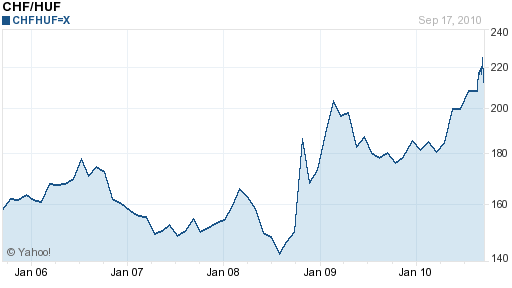September 19th 2010
Hungarian Forint Touches Record Low
Anyone who had bought emerging market currency(s) at the peak of the credit crisis in 2008 would have earned double digit annualized returns in the two years that have passed since then. There are only a handful of exceptions to this rule, and the most prominent one that I can think of is the Hungarian Forint. If you had bought the Hungarian Forint against the Swiss Franc (the base currency that most traders in the Forint look at, for reasons that I will explain below) in the fall of 2008, you would incur a loss of a 63% if you sold today. The Forint is down 11% in the last month alone. These are the kinds of numbers one might associates with mortgage-backed securities and credit default swaps, not currencies!

So why is the Forint in the doghouse? Ironically, the answer is connected to mortgages. During the inflation of the housing bubble, Hungarians preferred to borrow in Swiss Francs, because interest rates were significantly lower than domestic Hungarian rates. This was not a mere trend; it was a full-blown phenomenon: “About 5.4 trillion forint($24.1 billion), or two-thirds of Hungary’s overall household credit, is denominated in foreign currencies. Of that, 82 percent is in Swiss francs, according to central bank data.” When the housing and credit markets were stable, noone bothered to examine currency risk. Given how much the Forint has fallen against the Franc, you can bet they are now.
As if the decline in housing prices wasn’t bad enough, consider that Hungarians that borrowed in Swiss Francs have now seen their mortgage payments/balances increase by more than 50%, depending on when they took out their loans. It goes without saying that even under the best of circumstances, it would be difficult to find the wherewithal – let alone the motivation – to repay such a loan. When you throw an economic recession into the mix, the prospects for repayment become even more bleak. As the Hungarian Forint has depreciated, loan defaults have risen, further stoking the Forint’s depreciation and loan defaults.
Alas, the Hungarian government’s program for solving this crisis is to punish the banks, both by allowing borrowers to delay repayment and by levying a massive tax – the highest on the EU – on all banks. While this might be helpful for bringing down the country’s budget deficit to the 3% mandated by the EU, it probably won’t do much for the economy. Speaking of the budget deficit, it has prompted S&P to warn of a possible cut in Hungary’s sovereign credit rating to junk-status.
Hungary’s cause hasn’t been helped by the breakdown of talks with the EU and IMF that would have supplied it with emergency funding. As if it wasn’t obvious from the Forint’s decline, investors are beginning to fear the worst and are slowly turning away from Hungary. The country’s benchmark stock market index has fallen 4% over the last six months. Meanwhile, foreign lenders are starting to balk at buying Hungarian debt without some kind of EU/IMF backstop, much like the one that was afforded to Greece: “Auction saleshave been a barometer of investor confidence in the country. On Sept. 2, Hungary sold 35 billion forint of 12-month Treasury bills, 15 billion forint less than planned, after receiving bids for 63.4 billion forint of the bills. Five days later, it sold 60 billion forint of three-month Treasury bills, 10 billion forint more than planned.”
At this point, all eyes are on the Hungarian government to simultaneously boost the economy and repair its budget deficit: “The rating agenciesare taking the same line as the markets and giving the government until local elections in October the benefit of the doubt, but if they don’t see then either a recommitment to the IMF program, or real concrete measures I think they move to cut the rating to junk.” If that were to happen, the self-fulfilling downward spiral in the Forint would probably continue unabated.
It makes you wonder: if the Greek Drachma were still around, how closely would it resemble the Forint?




September 19th, 2010 at 6:38 am
It sounds similar to Iceland.
It doesn’t seem like a big hit to the Euro zone but a bigger problem for the Swiss.
If the haircut is 100%, the Swiss banks will lose ~$20.5B. A more probable haircut may be 50%, ($10B).
I wonder what the physiological impact will be….
September 19th, 2010 at 12:10 pm
Ouch, what a nasty situation for Hungarians to be in, I guess their only hope is a reversal of exchange rate for the Swiss Franc, though from the investor point of view it could mean that a lot of premium residential properties in Hungary’s main cities and countryside could become a lot cheaper, and I guess in a free market, wealth redistributes all the time. Shame for the families that lose their homes though.
September 19th, 2010 at 3:06 pm
In the attached link, Markus Salzmann of WSWS.org relates that the Hungarian government headed by Prime Minister Viktor Orbán has introduced a series of laws and initiatives aimed at building up authoritarian structures in political and social life.
The WSWS.org author believes “these measures have been taken largely in response to the demands of the International Monetary Fund and the European Union for drastic austerity measures.”
I don’t know if I believe that or not, I do know that history shows many times that out of chaos, authoritaran government arise.
You relate: “Two-thirds of Hungary’s overall household credit, is denominated in foreign currencies.”
I have to ask was it really worth it to get the credit? And was it really worth it for the lenders to lend the money?
It’s much like here in the United States, was it really worth it to have Fannie Mae and Freddie Mac lend to develop housing? Personally I think not. It would have been better to let people rent; that is expect people to rent.